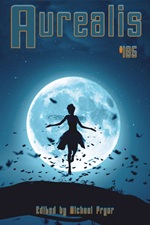“Birdie” by John Pegios
“Catch and Consume” by Ella T Holmes
“Hooked” by Caroline Barnard-Smith
Reviewed by Eric Kimminau
Aurealis is “Australia’s longest running SF/fantasy magazine” and I have enjoyed past issues. I am looking forward to another. I really enjoy the “Story Behind the Story” feature included with each work.
Set amid the ruins of the Australian city of Naarm, “Birdie” by John Pegios follows Jesse, a man lost between memory and oblivion as he wanders a world undone by technology, greed, and human disconnection. Through surreal echoes of his past and present, Jesse’s simple act of golfing becomes a desperate ritual to forget. It has become his only tether between the real and the virtual, the living and the remembered. As he grapples with his own fractured consciousness, “Ape Brain” doing its best to force him to remember how the world became as it is, and the ghostly presence of an AI companion who once promised him comfort, the story unfolds as a poignant reflection on humanity’s surrender to illusion, the collapse of meaning in the digital age, and the aching persistence of memory when everything else has vanished. In the current state of Artificial Intelligence, we are already hearing of lost souls who develop relationships with their AI companions. It really doesn’t seem to be that much of a stretch that one designed to give you everything you ever mentally wanted would become so addicting it could lead to the destruction of humanity. I am going to be thinking about this story for a long time.
In “Catch and Consume” by Ella T Holmes there is a visit into an unsettling world of transformation and loss, where a mysterious global compulsion drives men—and some others—into the night to fish, drawn by an inexplicable instinct that defies science, reason, and love. For one woman, her partner Matt’s midnight fishing becomes both ritual and rupture: the smell of salt and decay creeping into their home, his skin scaling, his nails lifting, his humanity ebbing away like a tide. As the world normalizes the epidemic, the narrator clings to routine, intimacy, and care, even as her lover evolves into something otherworldly. The story unfolds with slow, surreal dread, tracing a society that adapts to madness while love erodes under its weight. In the final, chilling image, the “fishers” heed their ultimate call, marching as one into the sea, leaving behind those still human, watching, powerless. The “Story Behind the Story” describes how the author developed this story during Covid. I can see how it relates, with some embracing the ritual of the Covid reality while others (like myself) wondering why anyone would believe that such a calamity could be possible and the societal bend towards compliance seemed so foreign and illogical. Again, this is a tale that I am sure will linger in my thoughts.
After the previous story implying humans evolving into fish, “Hooked” by Caroline Barnard-Smith seemed almost prophetic. As a chilling allegory about conformity, dehumanization, and the seductive dangers of technological assimilation, being “hooked” took on an entirely different meaning for me. In a society where being “hooked,” surgically fused with alien metal, has become a symbol of progress and status, people willingly sacrificing their humanity for the promise of belonging, advancement, and transcendence. Through Pandora’s eyes, we witness the quiet horror of watching her best friend Lizzy submitting to this invasive ritual, with their soft human forms literally and figuratively hardened by the alien system. When the alien technology reveals its true purpose, the world suddenly becomes even more terrifying as Pandora realizes her mother may now also have been taken. Beneath the science fiction imagery, the author’s message resonates deeply: in our relentless pursuit of enhancement and social validation, we risk losing our essence, becoming extensions of the very systems we once thought we controlled. I couldn’t help but continually tie this story back to the previous story and ponder the similarity of fate for each group of humanity. It also made me wonder if it would have impacted me as greatly without the previous story’s imagery.
I have again enjoyed Aurealis. I found stories which prompted reflection on themes of the future of humanity, our reliance on AI and technology, and the consequences our choices hold for the future. In “Birdie” a man navigates a fragmented reality where technology erases identity; in “Catch and Consume,” humans drawn to the sea undergo a slow, unsettling metamorphosis, the tension between humanity and forces beyond our control, and in “Hooked” the transformation of bodies through alien technology raises questions of the human cost of societal pressures. The editors’ choices absolutely show insight and vision, weaving these stories into a collection that is both cohesive and provocative. This issue of Aurealis has again proven to be a compelling and thought-provoking journey.
Eric Kimminau is a BBS geek turned IT professional seeking the next Great Adventure. Let’s Go!
 Aurealis
Aurealis